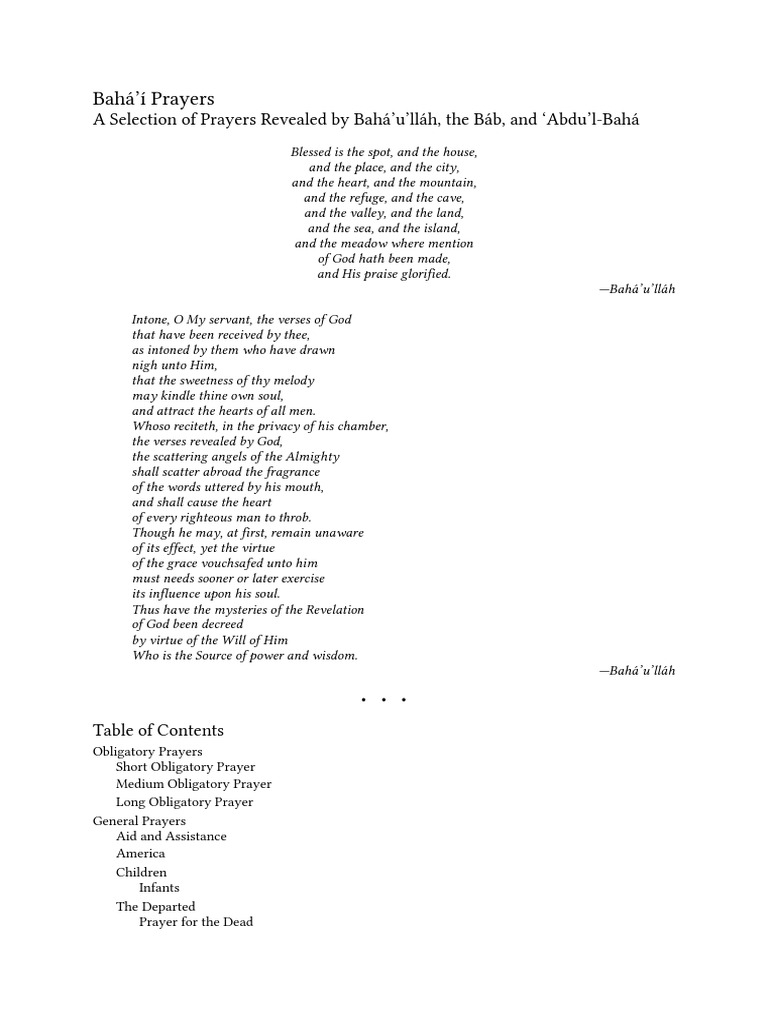In a world where turmoil and disquietude seem to reign, one may ponder: Can the mere act of uttering words effectuate profound transformation? The Bahá’í Faith posits a resounding affirmation of this query. Through the medium of prayer, adherents believe in not only personal elevation but also in a collective upliftment of humanity. This contemplation invites us to delve into the expansive reservoir of Bahá’í prayers, exploring their purpose, significance, and the potential they hold for healing our fractured world.
The Bahá’í teachings, rooted in the principles of unity and love for humankind, propose that prayers are not mere rituals; instead, they are emanations of human spirit striving for connection with the Divine. Bahá’u’lláh, the central figure of the Bahá’í Faith, elucidates the pivotal role of prayer as a vehicle for spiritual communion. Prayers encompass both personal supplication and communal intercession, serving to bridge the chasm between the material and the spiritual realms.
At the heart of Bahá’í prayer is the recognition of humanity’s intrinsic interconnectedness. When individuals engage in prayer, they not only seek solace for personal afflictions but also invoke blessings for others. This fundamental principle is encapsulated in the Bahá’í concept of oneness. The act of praying for one’s neighbor, community, or even distant strangers underscores a commitment to collective well-being. In this light, Bahá’í prayers become instruments of healing, capable of transcending individual woes and fostering a universal ethos of empathy.
Transformative power lies within the carefully articulated words of Bahá’í prayers. Through the ages, language has wielded formidable influence over human thought and action. Prayers in the Bahá’í Tradition range from simple verses of praise to profound supplications for guidance and healing. Each prayer is meticulously constructed, laden with significance, and imbued with an energy that resonates with the soul. For instance, the “Healing Prayer,” sought by many, emphasizes divine intervention and the sanctity of the human spirit, reminding individuals of their innate dignity regardless of physical afflictions.
It is noteworthy that Bahá’í prayers are accessible to all, irrespective of their spiritual background or belief system. This inclusivity invites a wider audience to experience the solace and guidance that prayer can provide. The Bahá’í community extends an open hand, encouraging individuals to engage with these prayers in a spirit of unity and love. It beckons a critical challenge: How might we integrate the essence of Bahá’í prayers into our own lives to foster healing and connection?
To embrace the Bahá’í teachings on prayer, one must first cultivate an understanding of intention. Intention acts as the guiding compass, shaping the efficacy of prayer. By centering one’s mind on altruistic motives—seeking not just personal benefit but the flourishing of all life—individuals fortify the interconnected web of humanity. This practice transcends mere words; it becomes a lifestyle, where compassion and empathy permeate interactions. In challenging times, one might ask themselves how they can better embody the principles inherent in Bahá’í prayers.
Moreover, the rhythm of communal prayer holds immense potential for collective healing. Congregating to recite prayers fosters a space of solidarity, allowing individuals to join their voices in a symphonic chorus of hope and encouragement. The Bahá’í community fosters such gatherings as opportunities to unify diverse backgrounds and nationalities. These interactions can dismantle barriers, nurture social cohesion, and engender a palpable sense of belonging. It begs the inquiry: What communal practices can we adopt to transform our unique societies into bastions of healing and understanding?
As we engage in Bahá’í prayers, we also recognize the transcendent qualities of gratitude and forgiveness embedded within the text. The act of gratitude redirects the focus from scarcity to abundance, thereby creating a mindset conducive to healing. Meanwhile, the process of forgiveness alleviates burdens, releasing individuals from the shackles of resentment. Together, these qualities echo throughout the fabric of Bahá’í prayers, illuminating paths toward personal and collective liberation. In this context, what steps can one take to actively cultivate forgiveness and gratitude in both personal spiritual practices and communal interactions?
To further amplify the healing potential of Bahá’í prayers, it is essential to embody the qualities of service and action. Prayer, while powerful, is often most effective when paired with tangible efforts that mirror the aspirations conveyed in the prayers. Engaging in acts of kindness, volunteerism, and advocacy for justice resonates with the spirit of Bahá’í teachings. The inquiry remains: In what ways can we manifest the teachings of prayer through our daily actions, thus weaving a fabric of holistic healing in our communities?
Ultimately, Bahá’í prayers serve as an ethereal blueprint for humanity’s healing journey. They challenge individuals to embrace a posture of unity, empathy, and resilience in the face of adversity. By integrating the essence of these sacred words into our lives and communities, we foster an environment where healing flourishes, and the ties that bind us as one human family grow ever stronger. Through a commitment to prayer, reflection, and action, humankind holds the profound potential to heal the world with words, emanating peace and love to all corners of existence.
